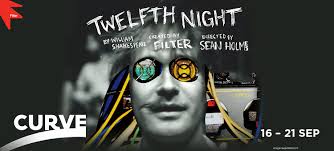
September 16, 2013, by Peter Kirwan
Twelfth Night (Filter) @ Curve, Leicester
This is a repost of a review written for Exeunt Magazine and is therefore not in usual Bardathon format. This production has been reviewed twice previously on The Bardathon, in its 2006 and 2008 iterations.
Filter’s reinterpretation of Twelfth Night as rock gig is almost seven years old, dated from its first public outing in Stratford in 2006, and in the second week of its 2013 tour it remains just as fresh and ever tighter. This current iteration, from the initial relaxed milling on the stage to the punk explosion of the climax, continued the company’s work of deconstructing classic texts and finding their chaotic, musical heart.
In this Twelfth Night songs are key, acting as numbers from which the action hangs. At times this is particularly revealing of a character’s mental state: Fergus O’Donnell’s Malvolio, for instance, grooving to a bass and drums rock number that establishes his swaggering pride long before picking up Maria’s letter. Sandy Foster as Feste swings suddenly between upbeat ska and an acapella ‘Come away death’, and calls on the band to introduce her demonstration of Olivia’s foolery. Even Lizzy Watts’s Olivia, fired up by her lust for Cesario, begins breathing heavily into a microphone (only to be repeatedly interrupted by Malvolio) and attempting to woo Cesario with the sexiest bowing of a cello yet seen on stage.
For the gig conceit to work, the audience needs to be invested. The production’s secret weapon remains the midnight revels, lasting a good fifteen minutes in an evening only ninety minutes long. Geoffrey Lumb, in full Elizabethan costume as Sir Toby and channeling Ben Affleck’s Ned Alleyn from Shakespeare in Love, begins singing ‘What is love’ from a prostrate position at the back of the stage, whispering so as not to wake anyone, and gradually, drunkenly, draws in Andrew and Maria, the musicians and the microphones. Ten minutes later and a roaring party Is in full swing: small children throw Velcro balls at grandfathers in felted helmets; a conga line stretches round the stage; audience members dance; and a delivery of pizzas is passed out among the audience. O’Donnell has to fight hard to shut down this party, screaming defiance at the audience’s rudeness and setting himself up for the pleasure taken in the sight of Malvolio reduced to tight gold pants and yellow stockings later in the play.
The quirks are not all necessary, but all add to the enjoyment of a Twelfth Night that refuses easy interpretation, from Viola storming off to refuse to take part in such a mess anymore to Toby spouting Hamlet’s soliloquy and refusing to be in this play. Jonathan Broadbent, not only doubling Sir Andrew and Orsino but also now promoted to Associate Director, MCs the chaos and contributes to the randomness, flipping backwards somersaults for his capers and allowing his ‘I was adored Once Too’ to be echoed by a ‘three, four!’ and a new song. Broadbent’s ability to be partially ouside the action he is part of (such as screaming ‘Cs, Us and Ts? But that spells…’) ensures that an ironic distance is always kept. Performances such as this keep the production on the side of festival in a way that stresses the quieter moments.
Polly Frame provides these by doubling as Viola and Sebastian. Both characters are sincere and earnest, but when brought together in the final scene they become transcendent. Frame talks to herself, lowering her voice for Sebastian and filling it with tears as Viola, manoeuvring between the two roles in a beautiful embodying of similar difference. Frame takes the hands of both her lovers and kisses them both, creating a final stage picture that unites Orsino and Olivia though their shared connection to one body.
Filter’s honest and enlightening Twelfth Night has persisted for so long because of its significance in battling the tradition of conservative performance of the play that turns it ever more into an early modern Downton Abbey. In reclaiming the play as gig, director Sean Holmes and tour directors Oliver Dimsdale and Ferdy Roberts acknowledge that this is a play of raw and uncontrollable emotion, exploding periodically into chaos, hilarity and infectious disorder.

I was this performance yesterday with my husband was very pleasantly surprised – 5 out 5 for me – acting great, a real chuckle and just shows that you can keep to shakespeare and still be comptemporary